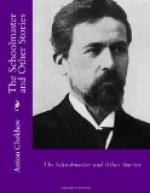Nadya went upstairs and saw the same bed, the same windows with naive white curtains, and outside the windows the same garden, gay and noisy, bathed in sunshine. She touched the table, sat down and sank into thought. And she had a good dinner and drank tea with delicious rich cream; but something was missing, there was a sense of emptiness in the rooms and the ceilings were so low. In the evening she went to bed, covered herself up and for some reason it seemed to her to be funny lying in this snug, very soft bed.
Nina Ivanovna came in for a minute; she sat down as people who feel guilty sit down, timidly, and looking about her.
“Well, tell me, Nadya,” she enquired after a brief pause, “are you contented? Quite contented?”
“Yes, mother.”
Nina Ivanovna got up, made the sign of the cross over Nadya and the windows.
“I have become religious, as you see,” she said. “You know I am studying philosophy now, and I am always thinking and thinking. . . . And many things have become as clear as daylight to me. It seems to me that what is above all necessary is that life should pass as it were through a prism.”
“Tell me, mother, how is Granny in health?”
“She seems all right. When you went away that time with Sasha and the telegram came from you, Granny fell on the floor as she read it; for three days she lay without moving. After that she was always praying and crying. But now she is all right again.”
She got up and walked about the room.
“Tick-tock,” tapped the watchman. “Tick-tock, tick-tock. . . .”
“What is above all necessary is that life should pass as it were through a prism,” she said; “in other words, that life in consciousness should be analyzed into its simplest elements as into the seven primary colours, and each element must be studied separately.”
What Nina Ivanovna said further and when she went away, Nadya did not hear, as she quickly fell asleep.
May passed; June came. Nadya had grown used to being at home. Granny busied herself about the samovar, heaving deep sighs. Nina Ivanovna talked in the evenings about her philosophy; she still lived in the house like a poor relation, and had to go to Granny for every farthing. There were lots of flies in the house, and the ceilings seemed to become lower and lower. Granny and Nina Ivanovna did not go out in the streets for fear of meeting Father Andrey and Andrey Andreitch. Nadya walked about the garden and the streets, looked at the grey fences, and it seemed to her that everything in the town had grown old, was out of date and was only waiting either for the end, or for the beginning of something young and fresh. Oh, if only that new, bright life would come more quickly—that life in which one will be able to face one’s fate boldly and directly, to know that one is right, to be light-hearted and free! And sooner or later such a life will




